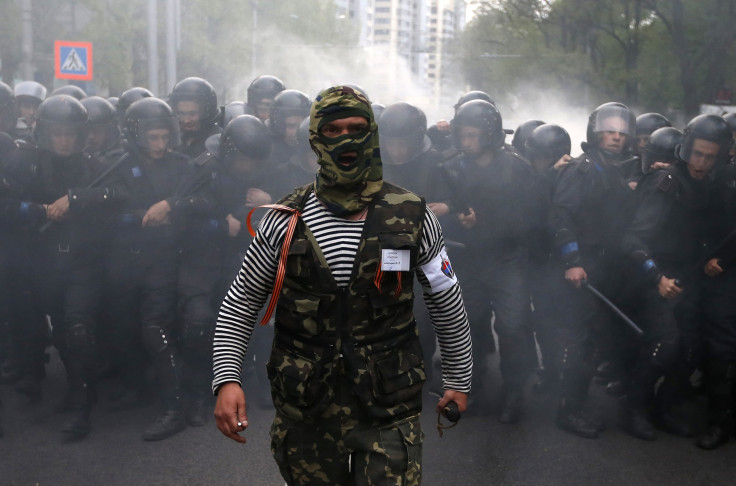Internal Combustion: Conflicting Loyalties In Post-Soviet Ukraine

Ivan is a 40-year-old ethnic Russian who lives in eastern Ukraine -- but not for much longer, if he and his fellow separatists get their way.
“[I] definitely want Donetsk to be independent from the bourgeoisie, fascist state,” he said. That’s how Russian propaganda refers to the interim government that took power after the overthrow of Ukraine’s pro-Moscow president, Viktor Yanukovich, in February.
The People’s Republic of Donetsk is the self-proclaimed state that sprang up in Ukraine’s east last month in response to the change in Ukraine’s capital, Kiev. No other nation, not even Russia, recognizes it.
Yanukovich received most of his support from the eastern region, where Ukraine’s ethnic Russians are concentrated, while the west is generally considered pro-Western and in favor of closer ties with the European Union.
Ivan embodies that division perfectly. “I’m a citizen of Ukraine, unfortunately, but I’m Russian,” he said. A railway worker who is nostalgic for the Soviet Union, he blamed the Ukrainian state for destroying the region’s economy and said he wanted to join Russia eventually, but that the priority should be to make the east independent.
Right now, what’s known is that there is a presidential election scheduled for May 25, and that the country is teetering closer to a civil war, as pro-Russian militias clash with supporters of the Kiev government.
On Friday, dozens were reported killed after clashes broke out in the southern city of Odessa. And in the east, militias shot down two Ukrainian army helicopters in a serious escalation of the conflict.
In an eastern village near Slovyansk, though, there was no violence even as separatists surrounded Ukrainian soldiers on a bridge and would not let them leave.
There were heated arguments, but they did not escalate, and some villagers shook hands and shared jokes with the soldiers.
Olga Seliverst, 27, a doctor who said she had come to help people if they got hurt, was no supporter of the Kiev government – “idiots,” she called them – but wanted the region to remain part of Ukraine, and did not believe a war would break out.
“People want to go [to] Russia because Kiev [is] not good,” she said.
On Thursday, separatists like Ivan gathered in front of the regional administration building in Donetsk, occupied by pro-Russian paramilitaries, to celebrate May Day, the workers’ holiday.
Ivan said he used to work at a plant in his hometown but was laid off and blamed the Ukrainian government for not doing anything about it. He now works as a repairman at the railway station in Donetsk.
Waving a red flag, he fondly recalled the Soviet era: “I know that at every enterprise there were announcements about vacancies and there were always demand for new workers.”
Stoking this longing for the good old days, and for Russia as the Soviet Union’s successor, was part of Russian President Vladimir Putin’s propaganda, said Adrian Karatnycky, a senior fellow at the Atlantic Council who also provides risk analysis to investors in Ukraine.
“It is nostalgia, so it’s not really based on fact, people forget about the absence of commodities,” he said. “The shelves were empty, so … you couldn’t get products, you couldn’t get high-quality footwear, you couldn’t get high-quality clothing, so there were all sorts of trade- offs.”
Things aren’t as bad as that in the economically depressed east of Ukraine today, but Karatnycky said it was unclear how bad the economy could become because no one knows how far Putin will go -- and such instability would drive away investors.
Natalia Varichenko, 36, who runs a private clinic in Donetsk, said she thought most people who supported independence were elderly citizens who missed the USSR. She’s a proud Ukrainian, and has no nostalgia for the Soviet past.
“If you saw their faces, you would see they’re crazy ... They have no education,” she said. “I don’t respect them at all, I don’t respect their views at all, they separated our country.”
Varichenko said her clinic has experienced a 20 percent drop in visits since the crisis began last month. She fears that as the conflict continues, so will the decline in customers: “Their lives become less comfortable, they have less money, the currency rate has changed … so people have less opportunity to take care of their health.”
She also complained that prices for everything from food to medicine has increased with the unrest, and says she pays 50 percent more now for drugs for herself and her 5-year-old son. If the region was taken over by Russia, she said she would sell her apartment and, along with her husband and son, move to western Ukraine.
Other ethnic Ukrainians do not share her view. Donetsk resident Anton, 28, who did not want to give his last name, said he was in favor of independence even though he identified himself as Ukrainian. Yet, he did not want to join Russia, because he believed tax money would not be kept in the east but be sent to the government in Moscow. And in an example of how complicated loyalties are here in east Ukraine’s depressed landscape of factories and coal mines, he said he wanted support from the Russian military, currently stationed just over the border, so that a referendum could be held.
Last month the autonomous Ukrainian region of Crimea held such a referendum, which resulted in an overwhelming vote for joining Russia. Perhaps not surprisingly, the vote was seen as illegitimate by many in the West, as well as the western region of Ukraine. But Crimea has been officially annexed by Moscow.
© Copyright IBTimes 2024. All rights reserved.





















